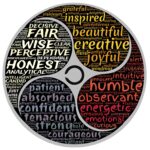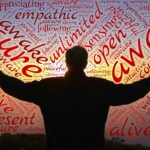There are many aspects of our lives that impact the direction we go as we progress through childhood and into adulthood including parents, peers, and of course these days, social media. As members of various concentric circles of influence (i.e., family, community, popular culture), it is normal (though not necessarily healthy) to adopt the norms, attitudes, and beliefs of the cultures in which we are immersed.
Our primitive instincts are another part of who we are that affect who we become and the life road we travel. Our most basic instincts, emotions, and reactions have evolved in us since living creatures first climbed out of the primordial muck more than 250,000,000 years. The most notable instinct is that of survival which has served us well since we officially became Homo Sapiens around 250,000 years ago.
Unfortunately, what worked then doesn’t necessarily work now. The survival instinct drives people toward safety, security, stability, and comfort. Though these descriptors sound very pleasant, they are quite antithetical to thriving which requires risk, uncertainty, instability, and discomfort. Moreover, for those of us for whom survival is no longer a concern in our lives, our survival instinct from the past prevents us from thriving in the present and future.
Thankfully, what enables us to thrive today is our ability to access three “selves” within us all. Each alone is not enough to grow as people; rather, each is dependent on the others to initiate, continue, and arrive at the person we want to be and to live the life we want to live. Harnessing all three is a powerful force to become the best version of yourself.
True Self (Destination)
It’s difficult starting off with the “true self” because it is hard to define, and it isn’t directly measurable or even identifiable. Rather, it is a part of us that we surmise based on our experiences, intuition, and aspirations. The conventional wisdom about the true self is that it represents the best version of ourselves we all wish to be. There is also research suggesting that the true self is viewed as moral and good.
By contrast, we also may possess a “false self,” which is comprised of attitudes and beliefs about ourselves that formed to accommodate pressures to conform to parental, peer, and cultural norms. The false self is generally considered to be incongruent with the true self, and may lead to unhappiness, stress, or various forms of mental illness.
The true self acts as the destination toward which we want to propel ourselves; “this is the person I want to be.” Gaining an understanding of our true self is essential to personal growth because it gives us a sense of the destination we want to get to in our developmental journey.
Value Self (Route)
There may be nothing more necessary to support the true self’s “mission” and nothing more counter-forceful to our primitive brain’s urges than the values that we hold. Values are what we deem most important and how we establish priorities in our lives. They are the road signs on our life’s travels because we go in a certain direction based on what we value in our lives. Another, more modern way of thinking about values in this context is that they are the “Waze” to the destination of our true self.
Perhaps the most common way people try to figure out what they value is to sit down and make a list of everything they believe in and then pick the ones that they believe are most important to them. At the same time, I’ve found this approach tends us to choose values that we think we should have rather than what values we actually do have. I have found the best way to know your values is to see what you devote your time, energy, and money to. Once you know your values, you can then make choices to live the life you want to lead based on those values.
Emotional Self (Fuel)
You may know your destination and have the directions to get there, but if you don’t have fuel in your tank, you aren’t going anywhere. That is where your emotions act as the fuel that propels you forward on the road established by your values to your destination of finding your true self.
At the beginning of this article, I may have given the impression that emotions, because they are part of our primitive brain and are so focused on survival, are of little use in our modern attempts to thrive. This intimation couldn’t be farther from the truth; on the contrary, emotions play a powerful role in our lives to both help us survive and thrive. Just as our survival instinct triggers emotions that satisfy its genetic imperative, so does our thrival instinct catalyze emotions that fulfill its own hereditary purpose thrusting us toward our true self.
All emotions evolved to motivate us to action (e.g., fear, to flee; anger, to fight; love, to procreate). To begin your journey to your true self ultimately involves tapping into the emotions that will propel you to your destination, with your values providing turn-by-turn directions. Essential emotions you need to tap into as fuel include hope, passion, joy, excitement, pride, inspiration, determination. Your ability to fully experience these emotions will determine your ability to begin and make progress in your journey, and ultimately, arrive at your destination of being your true self and thriving in your life.







